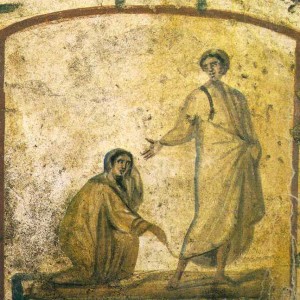Thoughts on Today’s Lessons for June 28, 2015
First Reading: Wisdom of Solomon 1:13-15; 2:23-24The Wisdom of Solomon, often called simply “Wisdom,” comes near the end of the Old Testament among the “Deuterocanonical” (apocryphal) books. Did you notice that it seems to start in the middle of a thought? The previous verses are given as advice to an earthly ruler, culminating in a warning to the king not to invite death or destruction by behaving badly. The two snippets from Wisdom that we read today move on to remind the ruler – and us – that God’s creation celebrates our life, not our death. God’s creation is a thing of beauty, and righteousness lives forever. Death and destruction are not God’s desire for us.
Psalm: Psalm 30
Like the Wisdom passage, today’s Psalm – traditionally understood as a hymn of thanksgiving upon recovery from illness – contrasts the joy of life in God’s favor against the grief of death under God’s wrath. Happily, God’s anger endures only for seconds, while God’s favor lasts a lifetime. “Weeping may spend the night,” the Psalmist memorably exults, “but joy comes in the morning.” We praise God, who turns our weeping into dancing and clothes us with joy.
Second Reading: 2 Corinthians 8:7-15
To understand Paul, it is often helpful to recognize him as a pastor who loved the people of his little church, but who often found them cranky and difficult to persuade. Knowing that his congregation in Corinth included both hungry poor people and comfortable rich members who sometimes didn’t want to share, he urges them all to live by the generous example of the churches in Macedonia (mentioned in the verses just before this): Do your work, earn what you deserve, but give according to your means so all may have enough.
Gospel: Mark 5:21-43
Jesus and the apostles have come back home from their trip across the Sea of Galilee. Now Jesus performs two surprising healings, encountering one on his way to attend to another. The woman with the 12-year hemorrhage was ritually unclean, poor and rejected by her neighbors, but she had great faith in Jesus. The 12-year-old child was the daughter of a leader of the synagogue, an important person; when Jesus said he could waken their seemingly dead child, they laughed at him. Jesus did not care about status. He healed both without question.

